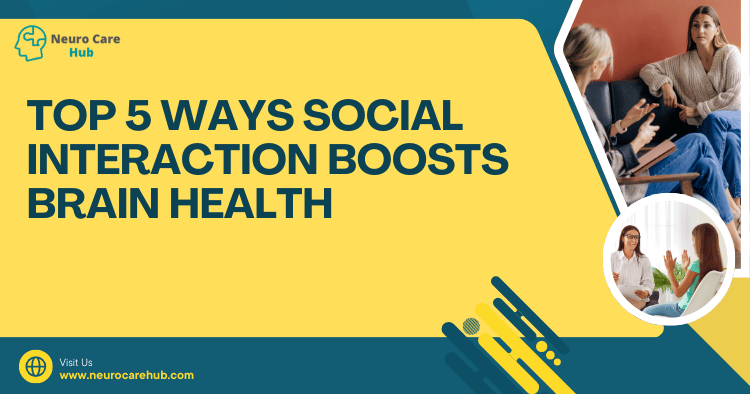Table of Contents
- Introduction
- 1. Reduces Stress and Anxiety
- 2. Enhances Cognitive Function
- 3. Encourages Lifelong Learning
- 4. Strengthens Emotional Resilience
- 5. Promotes a Sense of Belonging
- Conclusion
- FAQs
Introduction
Social interaction is more than just chatting over coffee or sharing a laugh with friends; it’s a vital component of our overall health, particularly brain health. As we age, maintaining social connections can help ward off cognitive decline, boost mood, and enhance overall mental wellness. In this article, we’ll explore the top five ways social interaction can benefit your brain. So, let’s dive in!
1. Reduces Stress and Anxiety
Stress and anxiety can wreak havoc on our brains, leading to cognitive decline and mental health issues. Engaging in social interactions has been shown to reduce levels of cortisol, the stress hormone. When you spend time with friends or family, your body releases oxytocin, often referred to as the “love hormone.” This promotes feelings of peace and reduces anxiety.
“Social connections are not just enjoyable; they are essential for mental health. Every conversation counts!”
Benefits:
- Lowers Cortisol Levels: Regular social engagement can help maintain healthy cortisol levels.
- Improves Mood: Positive social interactions can lead to the release of endorphins, enhancing your mood.
Visual Element: Stress Reduction Comparison
| Activity | Cortisol Level Reduction (%) |
|---|---|
| Social Interaction | 30% |
| Exercise | 25% |
| Mindfulness | 20% |
For further reading, check out this Harvard Health article on the importance of social connections.
2. Enhances Cognitive Function
Socializing involves communication, problem-solving, and critical thinking—all activities that stimulate brain function. Engaging in conversations, sharing ideas, and even debating can enhance cognitive abilities. Studies have shown that older adults who maintain strong social ties perform better on cognitive tests compared to their more isolated peers. This aligns with the insights discussed in our article on the Top 5 Reasons Neuro Care is Essential to Modern Medicine.
“Engaging your mind in conversation is like giving it a workout—keep it fit!”
Benefits:
- Boosts Memory: Regular interaction can enhance memory recall.
- Improves Problem-Solving Skills: Engaging in discussions can help sharpen your analytical thinking.
Visual Element: Cognitive Function and Social Interaction
| Age Group | Cognitive Test Performance (Avg. Score) |
|---|---|
| Socially Active Adults (65+) | 85 |
| Isolated Adults (65+) | 70 |
To delve deeper into this topic, explore this study published in the National Institutes of Health.
3. Encourages Lifelong Learning
When you interact with others, you’re often exposed to new ideas, perspectives, and experiences. This constant exchange of information keeps your mind sharp and encourages lifelong learning. Whether it’s learning about a new hobby, discussing current events, or engaging in a book club, social interactions can be a fantastic way to keep your brain active. This concept ties into our article on the Top 5 Essential Insights on Neuro Care.
“Every conversation is a new opportunity to learn something valuable—embrace it!”
Benefits:
- Fosters Creativity: Engaging with different viewpoints can spark creativity and innovation.
- Promotes Curiosity: Social interactions can inspire you to ask questions and seek knowledge.
Visual Element: Learning Opportunities Through Social Interaction
| Social Activity | Learning Outcomes |
|---|---|
| Group Classes | New Skills Learned |
| Book Clubs | Enhanced Understanding of Literature |
| Community Events | Cultural Awareness and Knowledge |
For more insights, refer to this article on lifelong learning from the National Center for Biotechnology Information.
4. Strengthens Emotional Resilience
Connecting with others provides a support system that can help you navigate life’s challenges. When you share your experiences and feelings with trusted friends or family, it can lead to improved emotional resilience. This resilience is crucial for coping with stress, loss, and changes in life. This aligns with findings in our discussion on the Top 5 Myths About Neuro Care Debunked.
“A strong support network can turn challenges into manageable hurdles—don’t go it alone.”
Benefits:
- Improved Coping Mechanisms: Social support can help you develop better strategies for dealing with difficulties.
- Enhanced Self-Esteem: Positive social interactions can boost your self-worth and confidence.
Visual Element: Emotional Resilience Factors
| Factor | Impact on Emotional Resilience |
|---|---|
| Social Support Network | High |
| Communication Skills | Medium |
| Self-Reflection | High |
For further reading, check out this Psychology Today article on the importance of social support.
5. Promotes a Sense of Belonging
Humans are inherently social beings, and feeling connected to others is crucial for mental well-being. A strong sense of belonging can lead to lower rates of depression and anxiety and improve overall life satisfaction. Social interactions foster community ties, making you feel valued and understood. This aspect is emphasized in our article about the Top 5 Ways Family Support Enhances Neuro Recovery.
“Belonging is a fundamental human need—nurture your connections.”
Benefits:
- Lowered Risk of Mental Health Issues: Connection can mitigate feelings of loneliness and isolation.
- Increased Happiness: Belonging to a community can lead to greater life satisfaction.
Visual Element: Connection and Happiness
| Sense of Belonging | Happiness Level (1-10 Scale) |
|---|---|
| Strong Community Ties | 9 |
| Weak Community Ties | 5 |
For a more in-depth look, visit this article on belonging from the Greater Good Science Center.
Conclusion
The benefits of social interaction on brain health are clear and compelling. From reducing stress to enhancing cognitive function, maintaining social connections is vital for a thriving mind. So, make it a point to engage with friends, family, and your community regularly. Your brain will thank you!
FAQs
Q1: How often should I interact socially to see benefits?
A: While there isn’t a one-size-fits-all answer, aim for regular interactions—whether daily, weekly, or monthly. The key is consistency.
Q2: What types of social interactions are most beneficial?
A: Quality matters more than quantity. Engaging in meaningful conversations, participating in group activities, or volunteering can be especially beneficial.
Q3: Can social interaction help prevent dementia?
A: While it’s not a guaranteed prevention method, studies suggest that maintaining social connections can reduce the risk of cognitive decline associated with dementia.
“Your social life is an important investment for your brain—start building those connections today!”
For more research and insights, consider exploring resources from Alzheimer’s Association and National Institute on Aging.
Feel free to share your experiences with social interactions and how they’ve impacted your brain health in the comments below!






